How South Dakota's social studies standards became so controversial
- Oops!Something went wrong.Please try again later.
It’s the final countdown for South Dakota’s social studies standards process.
Monday will be a big day for South Dakota’s education world, marking the fourth and final public hearing by the Board of Education Standards for the proposed standards, which has had thousands of united voices speaking in opposition of it during the course of the last two years.
The stage will be set at 9 a.m. in Pierre at the Ramkota Hotel and Conference Center for the meeting that could run until at least 5 p.m. and is already overflowing with opponents signed up to testify.
Opposition from those thousands may originate in 2021, when the Department of Education (DOE) removed more than a dozen references to the Oceti Sakowin from a draft of the standards that a majority-educator workgroup already agreed upon and recommended for approval to the board.
More: South Dakota DOE removed Indigenous topics from social studies standards before final draft
“Oceti Sakowin” refers collectively to the Lakota, Dakota and Nakota people who are Indigenous to South Dakota and surrounding states. The removal of the references sparked protests in Pierre at the time.
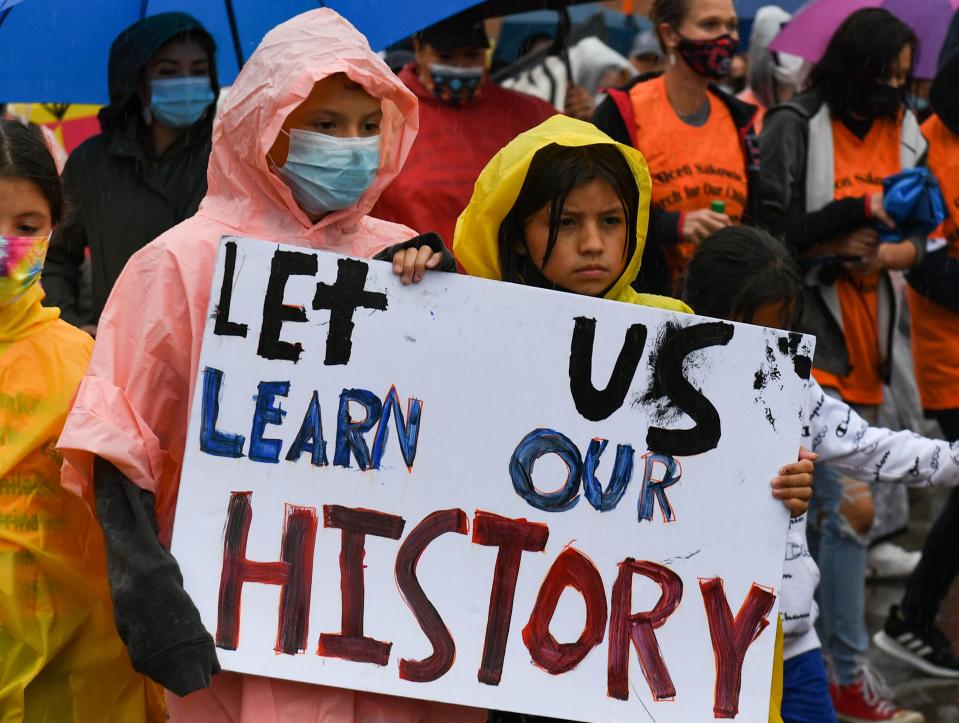
Contention from some of those thousands could’ve also been sparked later that year when Gov. Kristi Noem ordered the standards process completely start over, and that a new workgroup be chosen to draft new standards, despite those first set of standards never making it through a full BOES public hearing process.
Another possible catalyst for opposition may come from the Noem administration’s selecting members of the workgroup in 2022, which was majority-conservative, three times smaller and had far fewer educators.
More: 'It's a slap in the face': Gov. Noem draws criticism over new social studies standards workgroup
Or, opposition may come from those who resist the standards as they stand now, with influence from the conservative, private, out-of-state Hillsdale College, with a scope and sequence that educators have said isn't age-appropriate, and with opposition from the state’s nine tribes.
It could also prove costly, as some school districts like Sioux Falls and Belle Fourche have estimated switching to a new curriculum that will teach to the new standards could cost upward of millions of dollars.
However, there’s inklings the BOES could revert to the first workgroup’s draft of standards written before the DOE removed more than a dozen references to the Oceti Sakowin from the document.
More: Superintendents join call against South Dakota’s proposed social studies standards
The process could also restart again, for a third time. If that’s the case, the state will continue using and teaching to the social studies standards last adopted in 2015 while a third workgroup is formed.
Education will not cease if the standards aren’t approved. Rather, it will take more time to update the standards last revised more than eight years ago.
The current standards revision timeline from the DOE shows if standards are approved Monday, educators will transition to them in the coming years and begin teaching to those standards in the 2025-2026 school year. There is no statewide assessment in social studies.
To catch up to speed on all that has happened in time for Monday’s hearing, below is a timeline with links to Argus Leader reporting from each date or major event.
When did South Dakota's social studies review start and where did the controversy come from?
March 21, 2021: Noem signs Senate Bill 64, which includes a $900,000 appropriation of one-time funding to develop a South Dakota-specific K-12 civics and history curriculum and instructional materials, which Noem has said should help explain why the “U.S. is the most special nation in the history of the world.”
At the time, it was reported that $550,000 would go toward developing state-specific instructional materials and classroom resources, $200,000 would go toward pilot programs “focused on strengthening civics, government and history education” for school districts, and two expenditures of $75,000 would go toward professional development and an instructional materials review. These expenditures would later change.
May 5, 2021: Former DOE Secretary Tiffany Sanderson sat down for an interview with the Argus Leader to discuss the lack of required education on Oceti Sakowin Essential Understandings, and the upcoming social studies standards process. At the time, DOE spokesperson Ruth Raveling had said the standards review was separate from the $900K civics initiative.
May 26, 2021: The DOE signed off on a $227,179 contract with American Institutes for Research to hire Beth Ratway, a project facilitator for the standards process.
June 7, 2021: Three Rivers Special Services Cooperative delivered a training to social studies standards revision table leads on this date, as detailed in a $1,572 contract signed Jan. 4, 2021.
June 14-18 and June 21-23, 2021: A workgroup of 46 people, a majority of whom were certified to teach in South Dakota’s K-12 schools, met in-person in Pierre to draft the social studies standards together.
July 13, 2021: The Argus Leader reports Sioux Falls Rep. Sue Peterson and Rapid City dentist Rich Meyer, both Republicans, quit the social studies workgroup on the last day it met without publicly saying why.
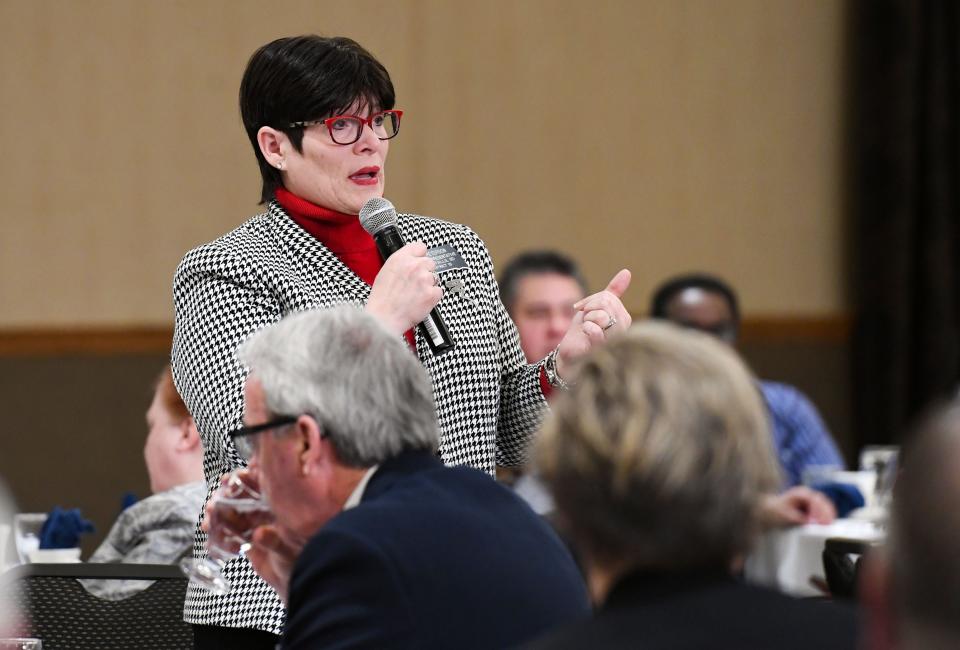
July 26, 2021: The remaining workgroup members finalized their draft of the social studies standards on this date.
Aug. 6, 2021: The DOE releases its draft of social studies standards. These were later revealed to have a dozen fewer references to the Oceti Sakowin than the workgroup’s July 26 version of the standards did.
Aug. 10, 2021: The Argus Leader receives a copy of the July 26, 2021 draft from workgroup members shortly after the DOE released its own draft, and reviews the changes between the workgroup’s draft and the DOE’s draft, publishing the first article on those changes on this date.
DOE officials confirm the department made “certain adjustments” before releasing their own draft to provide “greater clarity and focus” for educators and the public.
Aug. 10, 2021: After the Argus Leader publicized the changes between the workgroup’s draft and the DOE’s draft, several of the workgroup members began calling attention to the changes between their draft and the DOE’s draft, with many speaking to the press for the first time.
A majority of the workgroup, including tribal education directors, educators, retired teachers and college professors were upset or disappointed with the changes, but some, including Sen. Jim Bolin and Office of Indian Education (OIE) director Fred Osborn, weren’t miffed.
Aug. 11, 2021: Noem says she’s looking into the recent changes to the standards by way of the state’s standard public input process.
Aug. 17, 2021: The Argus Leader looks into why education on Indigenous topics is optional in South Dakota’s K-12 schools, and whether it should remain that way.
Sept. 9, 2021: Indigenous education advocates announce they’re planning a march in Pierre to oppose the changes to the social studies standards.
Sept. 13, 2021: Marchers in the Oceti Sakowin March for Our Children in Pierre call to make Oceti Sakowin Essential Understandings standards mandatory, to move the OIE back under the DOE’s control, to honor laws with tribal consultation on education, and to form a study session to enable opportunities for school choice.
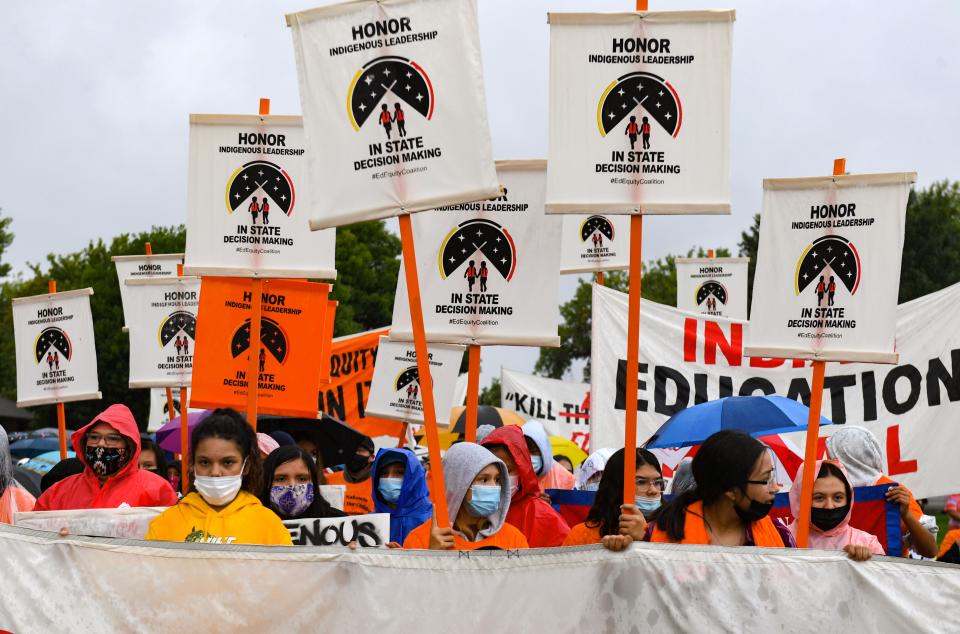
They also called on Noem, Sanderson, Department of Tribal Relations Secretary David Flute, and Osborn, to resign following the changes to the standards.
Sept. 14, 2021: The DOE decided to move the first of four public hearings for the proposed social studies standards from Sept. 20 at Holgate Middle School in Aberdeen to Oct. 25 at the Ramkota Convention Center in Aberdeen so there would be more space for testifiers. The meeting was moved back by a month to allow for a 30-day notice for the hearing.
At the time, the standards rollout process included DOE “capacity building” in 2022-2023, and then educators would teach to the new standards starting in the 2023-2024 school year, with assessments of the standards to come later.
Sept. 16, 2021: The BOES had received nearly 600 public comments ahead of the first hearing on the proposed social studies standards originally set for Sept. 20, with the majority of the comments in opposition to the changes.
Sept. 17, 2021: The Argus Leader looks into Indigenous education requirements in other states and compares their struggles to those seen in South Dakota.
Sept. 20, 2021: On the date of what was supposed to be the first public hearing on the social studies standards, Noem announced she’d instructed the DOE to delay changes to the standards up to one year to allow for more public input.
Noem's move came as groups on both sides have criticized Noem's approach to the standards process, including a column from the National Review arguing "hard-left activists" had taken over the process.
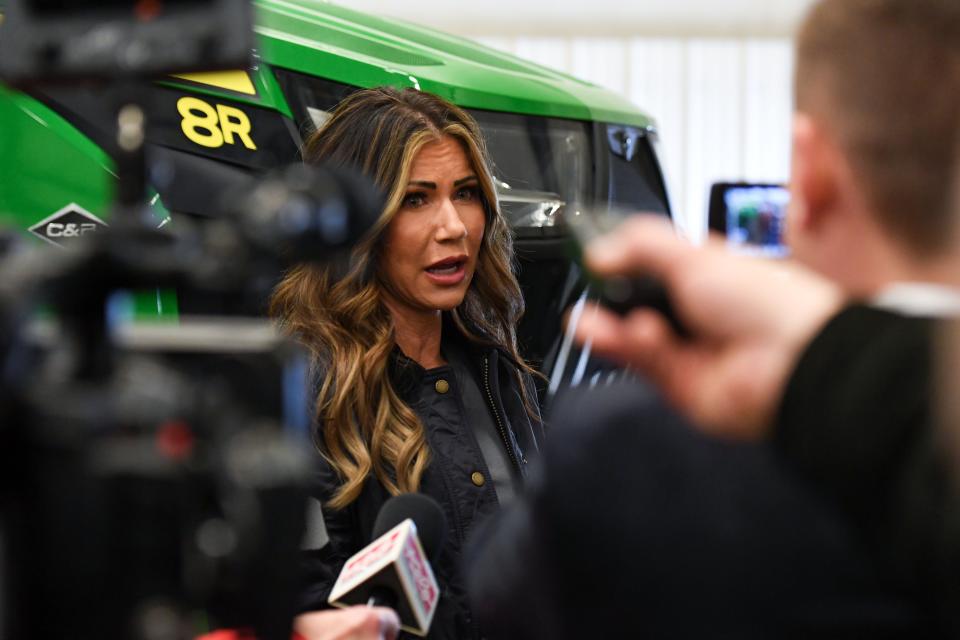
Sept. 23, 2021: The Argus Leader examined how Noem’s shift on the social studies standards process highlighted a disconnect with her DOE.
Oct. 1, 2021: Noem officially ordered that the social studies standards process be completely relaunched with a new workgroup, a new facilitator, a new timeline and a new set of standards.
Oct. 21, 2021: The ACLU of South Dakota argues Noem and the DOE likely break the federal Equal Protection and First Amendment provisions in the U.S. Constitutions by removing more than a dozen references to the Oceti Sakwoin in the standards.
The ACLU also argued that the DOE has failed to refute in any legal, factual or logical manner why the first workgroup’s recommendations shouldn’t be followed, as well as failed to justify disregarding that committee’s recommendations and starting the process again.
Oct. 25, 2021: The BOES voted on a new timeline for a second social studies standards revision process, with applications opening for the second workgroup on Nov. 1, a draft of standards scheduled to be released by August 2022, four public hearings to be scheduled from September 2022 to March 2023, and teaching to the standards to begin in August 2024.
Nov. 4, 2021: Indigenous education leaders spoke at the University of South Dakota about Indigenous inclusion, resilience and the social studies standards.
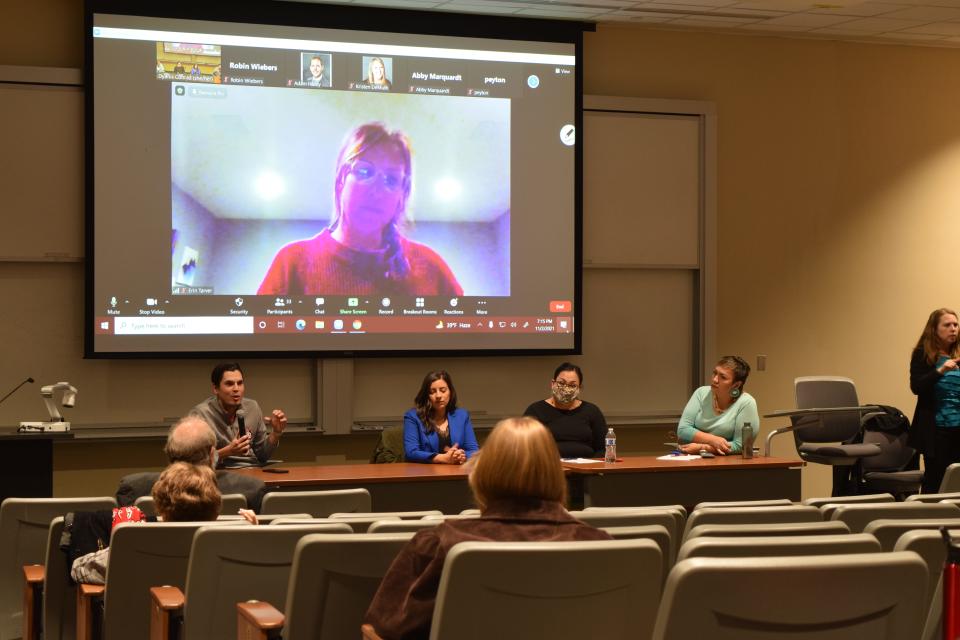
2022: A new social studies standards process and more outspoken opposition
March 4, 2022: The DOE and William Morrisey, a former professor at Hillsdale College in Michigan, sign off on a $200,000 contract for Morrisey to serve as the consultant and facilitator of the workgroup and public hearings from March 7, 2022 to March 30, 2023. The contract can be renewed at the state’s initiative for up to two additional one-year terms.
April 22, 2022: The DOE announces a 15-member workgroup will work on the second round of social studies standards revision. All together, the workgroup has a mostly-conservative, mostly non-educator makeup. The DOE said it received 203 applications from people wishing to join the workgroup.
April 25, 2022: The DOE and “East Dakota Educational Cooperative” or Teachwell sign a $89,520 contract for Teachwell to coordinate six social studies commission meetings.
April 27, 2022: The Argus Leader revealed that Noem and other top state officials played a role in selecting, interviewing and vetting members of the state’s second social studies standards workgroup.
May 4, 2022 through at least Aug. 15, 2022 or sometime before: This is when the second workgroup met in at least six different in-person or Zoom meetings to draft the social studies standards together.
May 10, 2022: Noem appointed Rich Meyer to take the place of longtime educator Jacqueline Sly on the BOES.
Aug. 15, 2022: The DOE released the second draft of social studies standards created by the new workgroup.
Aug. 22, 2022: Educators with the South Dakota Education Association (SDEA) announce their concerns about the “age appropriateness” of the standards for the emphasis on rote memorization in early grades, and the lack of critical thinking in later grades.
Sept. 13, 2022: Workgroup member Shaun Nielsen, a social studies teacher at West Middle School in Rapid City, told the Associated Press that the standards were “already written” and mailed to workgroup members from Hillsdale, Michigan, where Morrisey lives.
Sept. 15, 2022: The Argus Leader published an analysis comparing the current and proposed social studies standards.
Sept. 18, 2022: Nearly 500 public comments were submitted to the BOES on the social studies standards before the first of four public hearings. Multiple education-minded groups had released statements in opposition to the standards by this point, including the American Historical Association, SDEA, South Dakota Education Equity Coalition, the ACLU of South Dakota and South Dakota Voices for Justice.
Sept. 19, 2022: The first of four public hearings on the social studies standards was held at the Dakota Event Center in Aberdeen.
The opponents outnumbered the proponents at this meeting in speakers −35 opponents signed up to speak, but only 27 were given time to talk, compared to 27 proponents − and in written public comments − of the 707 total written in, 615 were opposed, 67 were proponents and 25 were neutral.
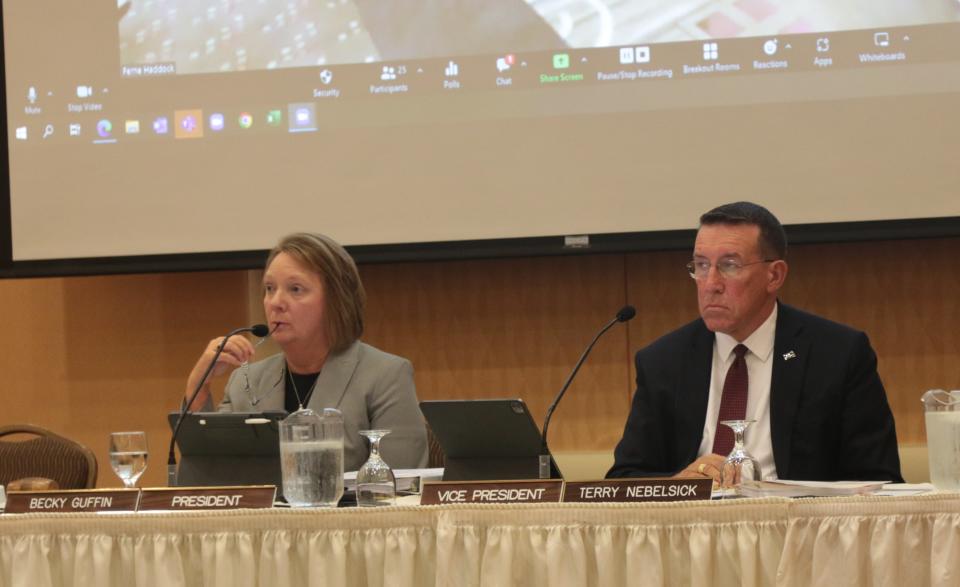
Oct. 4, 2022: The Argus Leader publicized approximately $94,074 of Noem’s $900,000 civics initiative that passed in the 2021 legislative session went to nine different civics grants for school districts across the state.
The remaining nearly $805,000 would go toward developing South Dakota-specific materials and resources, professional development for social studies educators and an instructional materials review, all related to the social studies standards process.
Nov. 16, 2022: Dozens of teachers in Harrisburg, Sioux Falls and Tea held “walk-ins” together outside their schools in the morning to call attention to the next public hearing scheduled to go over the social studies standards.
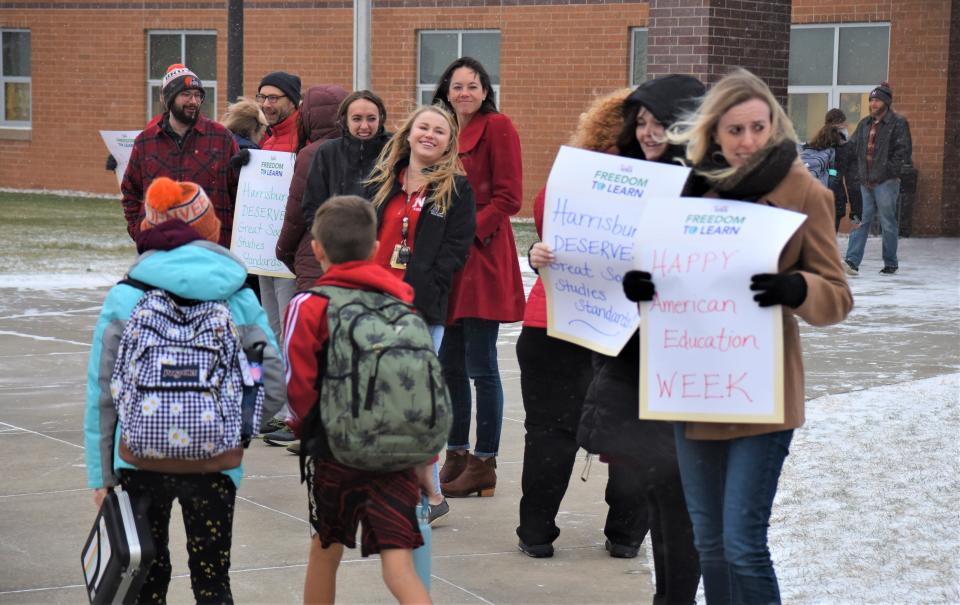
Nov. 16, 2022: As of this time, nearly 900 people had written public comments to the BOES ahead of the second of four hearings on the proposed social studies standards set to take place Nov. 21 in Sioux Falls.
Nov. 21, 2022: The second of four public hearings across the state on the proposed social studies standards was held at the Sioux Falls Convention Center. Twenty-two proponents and 33 opponents were signed up to speak during the meeting. The BOES had received 968 public comments on the standards by this time, with the majority -- 828 -- in opposition, 103 in support and 37 neutral comments.
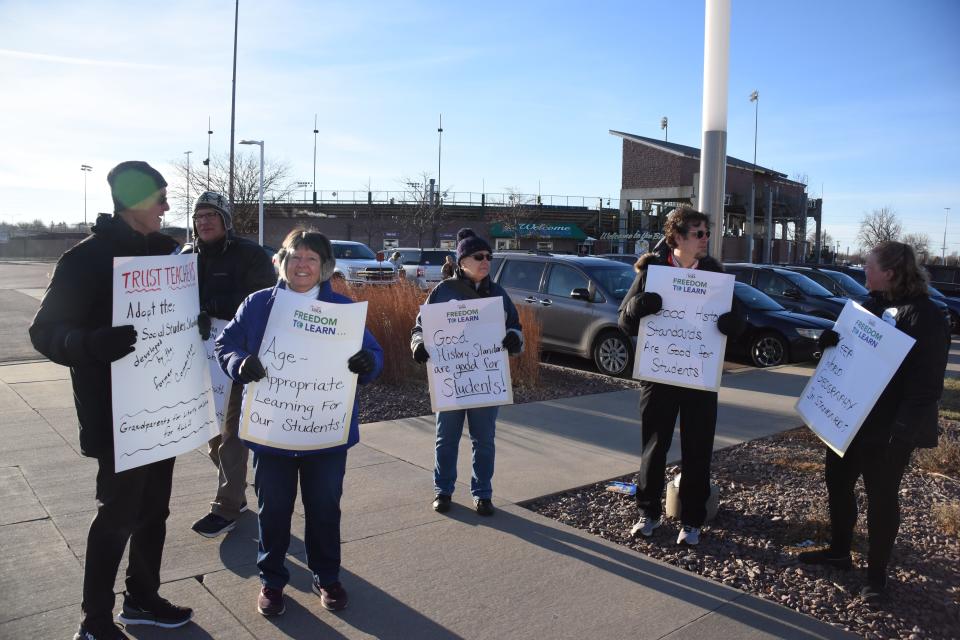
Nov. 23, 2022: Lake Area Technical College announces DOE Secretary Tiffany Sanderson is going to serve as the college’s next president, therefore leaving her role at the DOE.
2023: Department of Education shakeups and two more hearings
Jan. 4: Noem announced she’d picked Mitchell School District superintendent Joe Graves to be the next DOE Secretary.
Jan. 6: Graves sat down for a Q&A with the Argus Leader and gave his take on the social studies standards process before he took the helm of the department on Jan. 10.
Jan. 9: The BOES changed the location and date of the third of four public hearings on the proposed social studies standards from Saturday, Feb. 11 in Pierre to Friday, Feb. 10 in Rapid City.
Educators had initially asked the BOES for a weekend hearing date in the center of the state so that more of them, as well as working parents across the state, could testify on a date that wasn't a school day. Teachers across the state lamented the board’s unexpected change.
Jan. 13: The DOE made some minor revisions to the social studies standards, to which SDEA responded Jan. 23, saying the current proposal still failed to include content-rich geography standards.
Feb. 8: Noem appointed local businessman Steve Perkins to take the place of Aberdeen School District superintendent Becky Guffin on the BOES after her term ended Dec. 31, 2022.
Feb. 10: The BOES holds the third public hearing on the social studies standards in Rapid City. Nearly 1,100 people had submitted written testimony to the BOES, including comments from 117 proponents, 940 opponents and 37 neutral testifiers.
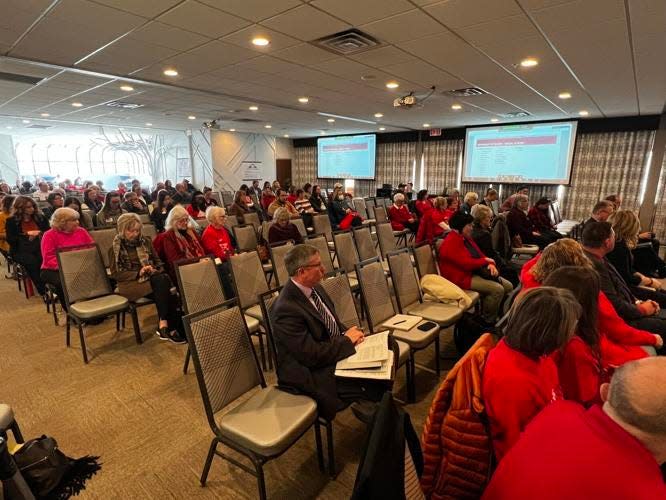
Feb. 21: In a Senate Education committee hearing, new BOES member and 2021 workgroup member Rich Meyer said he found much of the 2021 workgroup to be “very focused” but felt that the standards he worked on in the high school U.S. history group “were already set before our conference started.”
March 10: Sanderson would not answer the Argus Leader’s questions about who made the changes to the workgroup’s draft and other related topics.
April 11: The DOE puts out the agenda for the fourth and final public hearing on the social studies standards, as well as a new 1,312 page document of public comments submitted to the BOES on the standards.
April 11: South Dakota’s School Superintendents Association signed onto an open letter opposing South Dakota’s proposed social studies standards. Former BOES member Becky Guffin also signed onto the letter, giving one of the first indications of where any BOES member, past or present, besides Meyer, stood on the issue.
By this time, 23 of the state’s 149 public school districts have publicized statements opposing the proposed social studies standards, according to what SDEA has tracked so far.
April 13: Superintendents from Sioux Falls, Harrisburg, Brandon Valley and Tea signal they also oppose the standards during a Greater Sioux Falls Chamber of Commerce meeting.
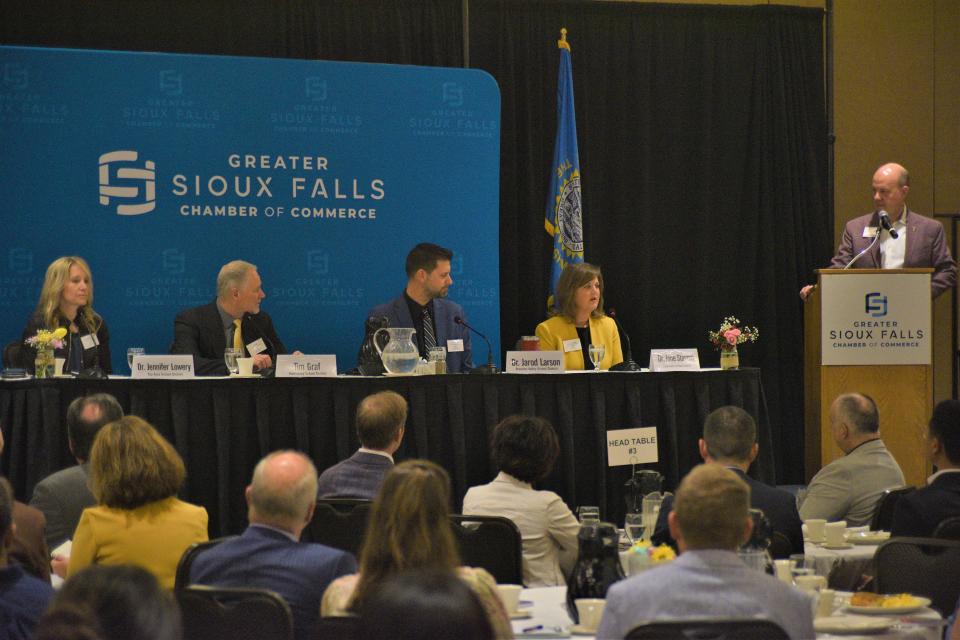
April 17: The BOES will hold its fourth and final public hearing on the social studies standards in Pierre.
This article originally appeared on Sioux Falls Argus Leader: Final SD social studies standards hearing is Monday. What to know

